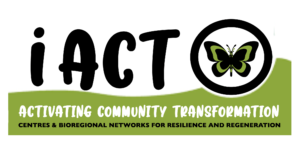Places Transforming Communities (iACT)
The iACT project exists to increase the number and quality of sites across Europe demonstrating sustainable living and to share best practice in the fields of sustainability, regeneration and resilience. The Permaculture Association of Britain (PAB) is the lead partner on the iACT project, with 6 EU partners involved, including Cloughjordan Ecovillage.
What are Learning and Demonstration Centres and why are they Important?
Learning & Demonstration Centres have a unique and critical role to play in our journeys towards a genuinely sustainable and resilient future. This is because:
- Centres provide physical demonstrations of regenerative sustainable practices: in the process they provide visitors and learners with opportunities for hands-on, experiential learning which embeds learning more deeply in a way that other forms do not.
- Centres are place-based hubs: which make the broad themes of sustainability and regeneration relevant to their particular local and regional context in terms of people, culture, climate and landscape.
- Centres provide a focus for activity and networking: bringing a broad ecology of people together in varied roles from practitioners to educators to learners– so helping to catalyse people’s learning journeys.
Below you will find information on the seven main areas that underpin a thriving demonstration project: design, enterprise, management, demonstration, learning, community engagement and networking.
Places Transforming Communities
These pages introduce the iACT project and its goals. What is a demonstration centre? Why are they important and how do they support the growth of the permaculture & regenerative movements? How do they empower communities and individuals to change?
What do I need for a great project design?
Good design at the early stage will make a significant long-term difference to any project. If well presented this can really help people understand and be inspired by your project, whether they are part of the project team, external stakeholders (such as funders) or your target audiences.
How do we become a thriving enterprise?
When it comes to income generation for your project, understanding its character and scale is crucial. The nature of your endeavour will determine which income-generating activities are most suitable.
What is needed to manage and organise projects well?
Having the right management and structure is essential part of any projects design to enhance the stability, longevity and sustainability of your centre. With well-organised leadership and robust systems in place, your project can confidently navigate challenges and achieve its objectives.
What is involved in creating a great demonstration centre?
As the old adage says, ‘you have to see it to be it’, which makes demonstration centres crucial to support behaviour change. Explore how to support behaviour change, share innovation and good practice in sustainable living and design good place-based learning experiences.
How do we create a brilliant learning and activity programme?
This is a topic that depends on many factors. For example, are you a specialist centre or a generalist project? Where are you based, where is your audience coming from and how easy is it for them to get to you? What are they looking for and what do they need?
How do I activate community engagement?
Activating community engagement in a project is crucial because it fosters a sense of ownership and inclusion, making the community feel invested and committed to the project’s success. It also brings diverse perspectives and valuable insights to the table, leading to more effective decision-making and sustainable outcomes.
How do we increase our impact locally and regionally?
As a permaculture or regenerative project, it is valuable to enhance your impact both locally and regionally, creating a ripple effect of positive change within your immediate community and beyond. By actively participating in Climate Action, Sustainability, Regeneration, and Community Resilience, you align your project with personal and local-to-global endeavours to address environmental challenges and promote long-term ecological harmony.
The iACT project was funded by the European Union through the Erasmus+ programme.



 Movement Building
Movement Building





